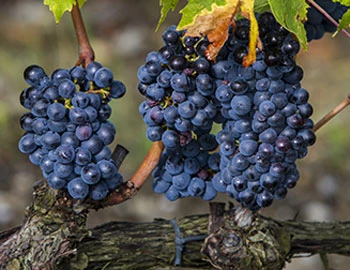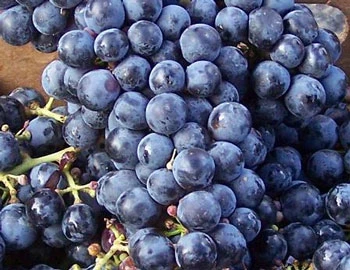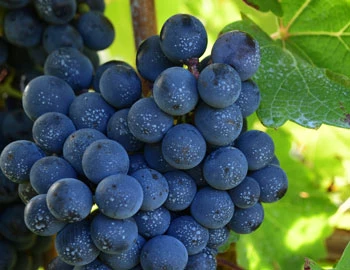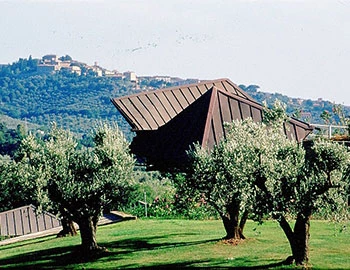
Solaia 2020
IGT Toscana, Antinori, 750 ml

| Grape variety: | Sangiovese, Cabernet Sauvignon, Cabernet Franc |
| Producer: | Marchesi Antinori |
| Origin: | Italy / Toscana |
Attributes
| Origin: | Italy / Toscana |
| Site / vineyard: | Solaia |
| Grape variety: | Sangiovese, Cabernet Sauvignon, Cabernet Franc |
| Ripening potential: | 5 to 20 years after harvest |
| Drinking temperature: | 16 to 18 °C |
| Food Pairing: | Châteaubriand, Filet Wellington, Roast saddle of venison, Tagliatelle al tartufo |
| Vinification: | fully destemmed, long must fermentation |
| Harvest: | hand-picking |
| Maturation: | in new barriques, long cultivation |
| Maturation duration: | 18 months |
| Volume: | 14.0 % |
| Note: | Contains sulphites |
Sangiovese
Epitome of Tuscany
Chianti classico, Brunello di Montalcino, Vino nobile di Montepulciano: the Sangiovese is in each of the classic red wines from Tuscany. For a long time, it was assumed that its birthplace was here. After all, it appeared under various synonyms in Tuscan documents dating from 1600. But in 2004, researchers unveiled that one of its parents originated in Calabria in southern Italy. Today, it is the most planted variety in Italy. In addition to Tuscany, it fares well in Emilia-Romagna, Marche or Umbria. It is an exceptionally lovable wine: its aromas of cherry and plum, violets and spices are complemented by fresh acidity and a juicy texture. It wins people around both as cheerful, drinkable wines with pizza and pasta and as barrel-aged top class wines. Carried by Italian immigrants, it found its way to California and Argentina. However, it does not have the same reputation there.

Cabernet Franc
Forefather of the Bordeaux varieties
The Cabernet Franc is one of the oldest varieties of Bordelais and a parent of three other red grapes in the Bordeaux assortment: Cabernet Sauvignon, Merlot and Carmenère. It is distinguished by its complex, flavourful bouquet of raspberry, graphite, violet, liquorice and white pepper. In addition, it presents round, crisp tannins which turn out less strongly than those of Cabernet Sauvignon. While the Cabernet Franc always appears as part of a blend in Bordeaux, it is pressed alone on the Loire. The most renowned appellations are Chinon and Bourgueil. Incidentally, the Cabernet originates not in Bordeaux but in the Spanish Basque Country. Cabernet owes its name to the Latin “carbon”, meaning black.

Cabernet Sauvignon
The backbone of Bordeaux
The Cabernet Sauvignon gives the Bordeaux its backbone, yielding deep violet wines with powerful tannins and endless ripening potential. It is the top dog in Médoc, and is placed in all five premier crus of Bordelais. When young, it often appears strict and unapproachable, but with advancing years, its tannins round off. It is wonderfully velvety, and yet always maintains its freshness. Typical flavours include cassis, graphite and cedar. Wherever Cabernet Sauvignon is found, Merlot is not far away. It complements the robust structure of Cabernet with softness, fruit and richness. The Cabernet Sauvignon is the most-exported vine in the world. It delivers persuasive qualities in Italy as an ingredient of the Super Tuscan, or as the flagship variety from California. There, it is lovingly titled “Cab Sauv”. Meat fans should be aware that it fantastically accompanies a grilled entrecôte. The family tree of Cabernet Sauvignon is surprising: its parents are Cabernet Franc and the white Sauvignon blanc.

Italy
Italy – Where wine is a way of life
The Italian wine regions are extremely diverse, and this is made clear in their wines. Established varieties such as Merlot, Syrah, and Sauvignon can be found on just 15 percent of the total vine growing area. The remaining 85 percent is reserved for autochthonous, indigenous varieties. More than 2,000 different grape varieties are grown under diverse conditions and pressed with various techniques into wines that reach the top tier of the international wine market.


